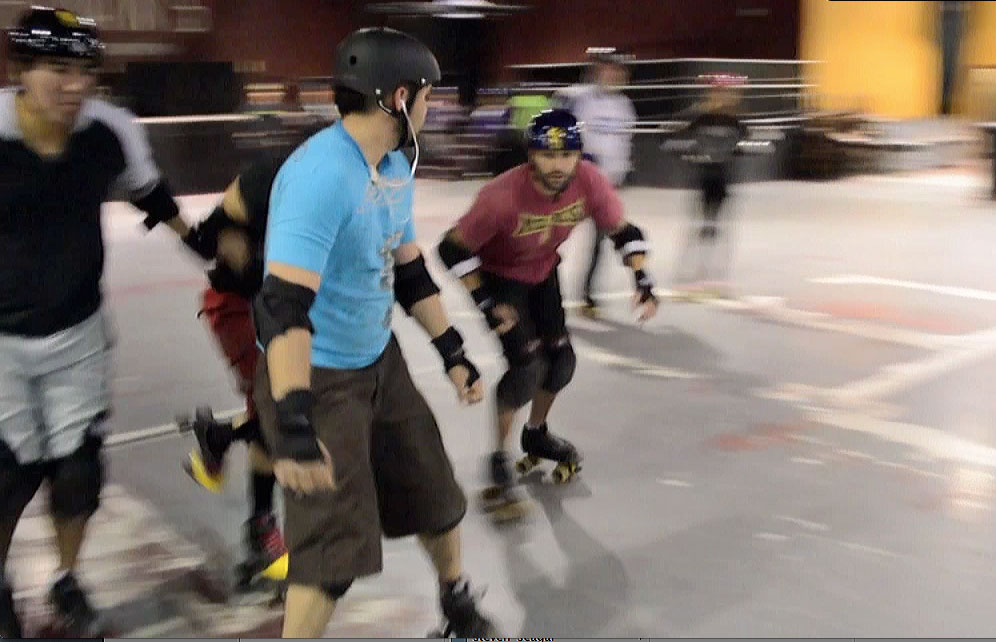EL PASO – The interview process with the men’s roller derby teams had been stimulating, attending the practice had been inspiring (although a little scary at times), and the writing process had been consuming.
Altogether writing about one of Texas’ few men’s roller derby teams brewing right here was one of the best experiences I’ve had as a journalist in El Paso. After three years of journalistic writing, this was the story I was the most amped about covering. After months of waiting for the chance to get the story, hours of work, and bubbling excitement – my story was published. I sent a text of ‘thanks!’ and ‘hope you enjoy’ to my sources, and anxiously waited for their texts back of approval.
And they hated it.

The Dead Bolts is one of only three other men’s roller derby teams in Texas. (Amber Watts/Borderzine.com)
Back in October 2012, I had stumbled across a Facebook page with a flyer reading, ‘men’s roller derby practice’ to be held at the El Paso County Coliseum. At the time, I was interning at ABC-7 and had told my supervisor about the up and coming practices, which led to some on-air interviews with the men’s roller derby founder, Prettie Poison. Since I was just an intern there wasn’t much else I could do about it, but I knew I wanted to be the first to cover all their firsts. I became too impassioned, I think, and the men’s roller derby story felt like it had this bizarre destiny to be my story. Especially because four months after seeing the public Facebook post, no one had picked up on it.
Once I was writing for Borderzine, I jumped on the opportunity to interview Prettie Poison. I was hungry for a good story, and as a student journalist my hope of impressing my family, editors, and sources had become overwhelming. My first interview with Prettie Poison was supposed to be only about 30 minutes long and only concerning the new men’s team. Somehow, it turned into an hour- and-a half. I found myself asking more questions about roller derby culture, as well as Prettie Poison’s own personal love for the sport, fitness/mental requirements to play, etcetera.
The roller derby world was foreign to me. All I knew about it was from what I had seen in the Drew Barrymore movie, “Whip It”. As a novice to the sport, I found everything Prettie Poison said about the sport completely enthralling. For a minute, she had almost convinced me into joining it myself.
“Some people are gonna hate you” a professor had told my freshman colleagues and I, all aspiring journalism students, on the first day of class. It was a forewarning, a somewhat brutal one, and yet, a very honest one. Because as a journalist, as I have now learned – you will never be able to make everyone happy, and some people will get very upset. We writers carry a lot of weight in words, in that way.
Those dismal words may nearly enough to make you reconsider your career choice, but I didn’t think about them again until three years later. They reverberated through my brain after I received a lengthy, disheartening email from the president of the roller derby league who was upset about some “misrepresentations” I had stated in the article and wanted the whole thing brought down. I was beyond sick to my stomach.
However, I’m still here and still writing. I have felt that totally consuming feeling of writing a story you believe in and have finally felt the sting of rejection – and they both move me and help me to continue writing. As a graduating journalism student, I think I learned the most with that one story, than I did throughout all my journalism studies. Internships, classes, and workshops combined – there’s nothing like having someone hate your work that makes you push harder. And since there are an awful lot of people in this world, I’m prepared to be pushing and bettering my craft all the time.
“If you write a controversial story and both sides hate it, you know you did a good job,” said Borderzine editor David Smith-Soto.



So you wrote an article about an organization within a sport, had inaccuracies and misrepresentations about a league, refused to take the article down, and then wrote an additional article about how they hurt your feelings?
While I am a skater myself, I don’t know this league. In fact, I’ve never even heard of them before finding your article via Google. But the truth is that the media is just now starting to cover roller derby in earnest and there’s a lot of reporters who just don’t get it. And while it’s a pretty great movie that I recommend, Whip It is to real roller derby as Fast and the Furious is to real drag racing.
The truth is that roller derby struggles to be recognized as an honest sport with true athletes, not a circus sideshow. We’re not all gay. We’re not all from the same background. We all have various reasons to get into the sport. But your article, just like many others, doesn’t tell the reader anything about how to play or what derby is really about… it just says the same thing as every other article and it’s full of holes.
I still respect reporters who write about derby for their effort in trying to get it right, but this …diary entry of sorts reflects so much more on the writer’s still-developing journalistic skills (or lack thereof) than the topic. You are no Walter Cronkite; you’re not writing a thrilling expose. You reported on a complicated and still-emerging sport and you got it wrong, and unfortunately as a writer that is bound to happen in your career. However, it would have said much more for Borderzine to move on without acknowledgment than to buy a cake for this pity party.
Did you just write an article to complain about how the subjects of another article didn’t like your article? This is embarrassingly unprofessional. If you’re a “journalist”, then do your job. Report, and save the whining for Facebook.
I fully agree with the above comment.
As a skater I cringed at the article because it’s just another article reporting the same thing the majority of every other article on roller derby writes about. As someone who works in education, I also cringed at the rather exuberant use of superfluous descriptives characteristic of someone who is trying too hard.
If you want the roller derby community to not be upset with your reporting, write an article promoting the legitimacy of the sport and not making derby analogous to a circus side show. Here’s a great current example http://espn.go.com/blog/playbook/fandom/post/_/id/21305/meet-the-lebron-james-of-roller-derby#more
Or take an entirely new angle about the business side of roller derby and how hard these dedicated skaters are working not only to be the best athletes they can be; but also figuring out how to run and manage a small business (roller derby league-including finances, PR, merch, sponsorship, and all the other things that go into a roller derby business) on top of whatever real world job the skater also does. (But please avoid the librarian by day, derby girl by night…that is also well overdone and not accurate of derby as a whole) Write about Rose City Rollers http://www.rosecityrollers.com/ a group of women in Portland Oregon who have worked hard and become successful enough to have over 650 active volunteers and several paid positions in the league. (Hooray for promoting successful women based small businesses. FYI I’m not a member of Rose, I live on the opposite coast, but I am so impressed by what those ladies have done.)
Definitely don’t complain when a dedicated athlete who is trying to manage a small business, athletic training, coaching and their real job that pays the bills, gives you their time (staying 60 minutes longer than the interview is scheduled for is an extra imposition on a skater’s time as well as not indicative of a professional) and then is upset when you write an article that doesn’t accurately reflect the sport. The criticism should fuel you to do better next time. It seems you went into this assignment, like most of the other people who report on derby, already knowing the story you wanted to tell instead of actually spending the time to figure out what the real story is.
Ditto on all of the above constructive criticisms, well put!